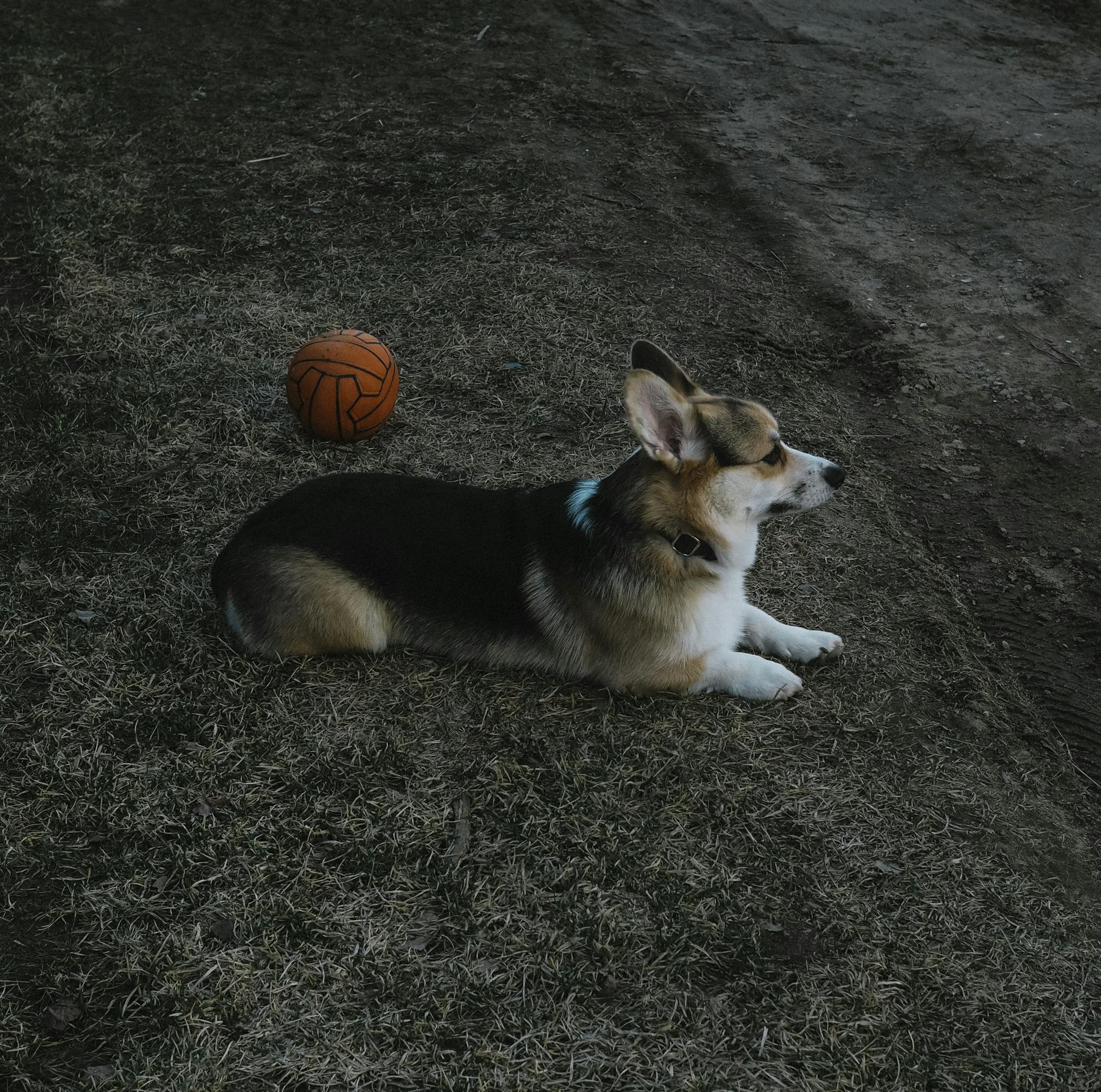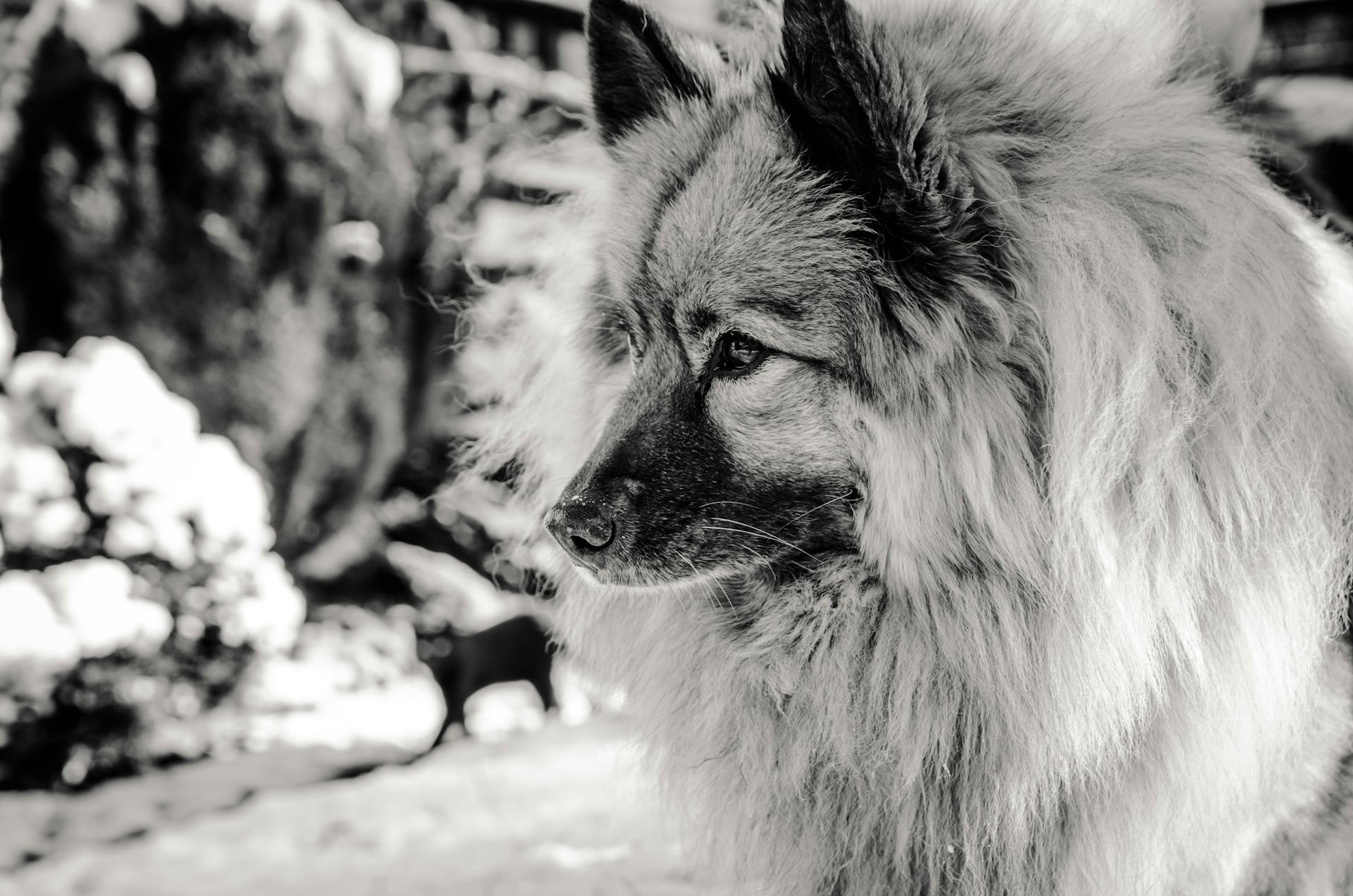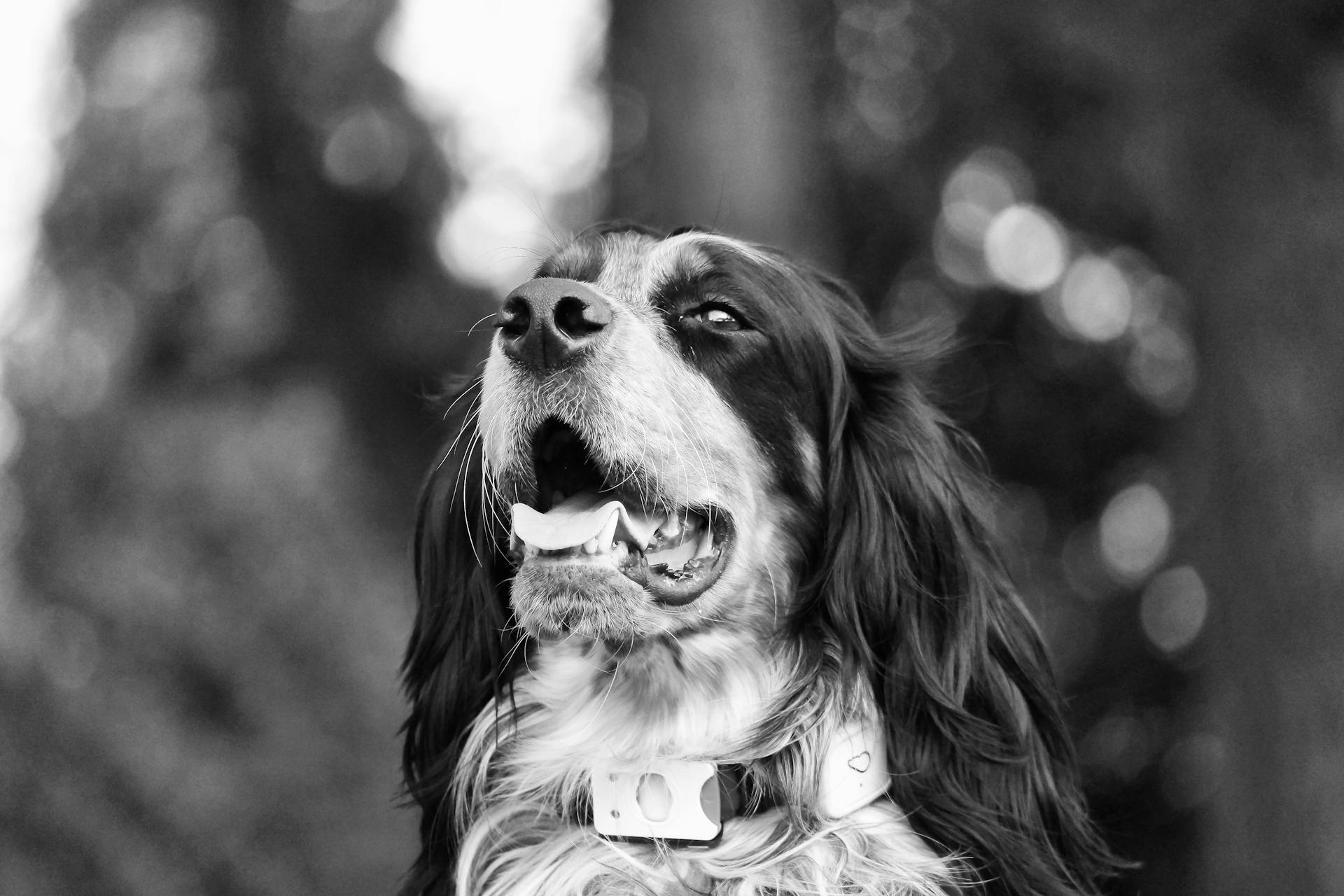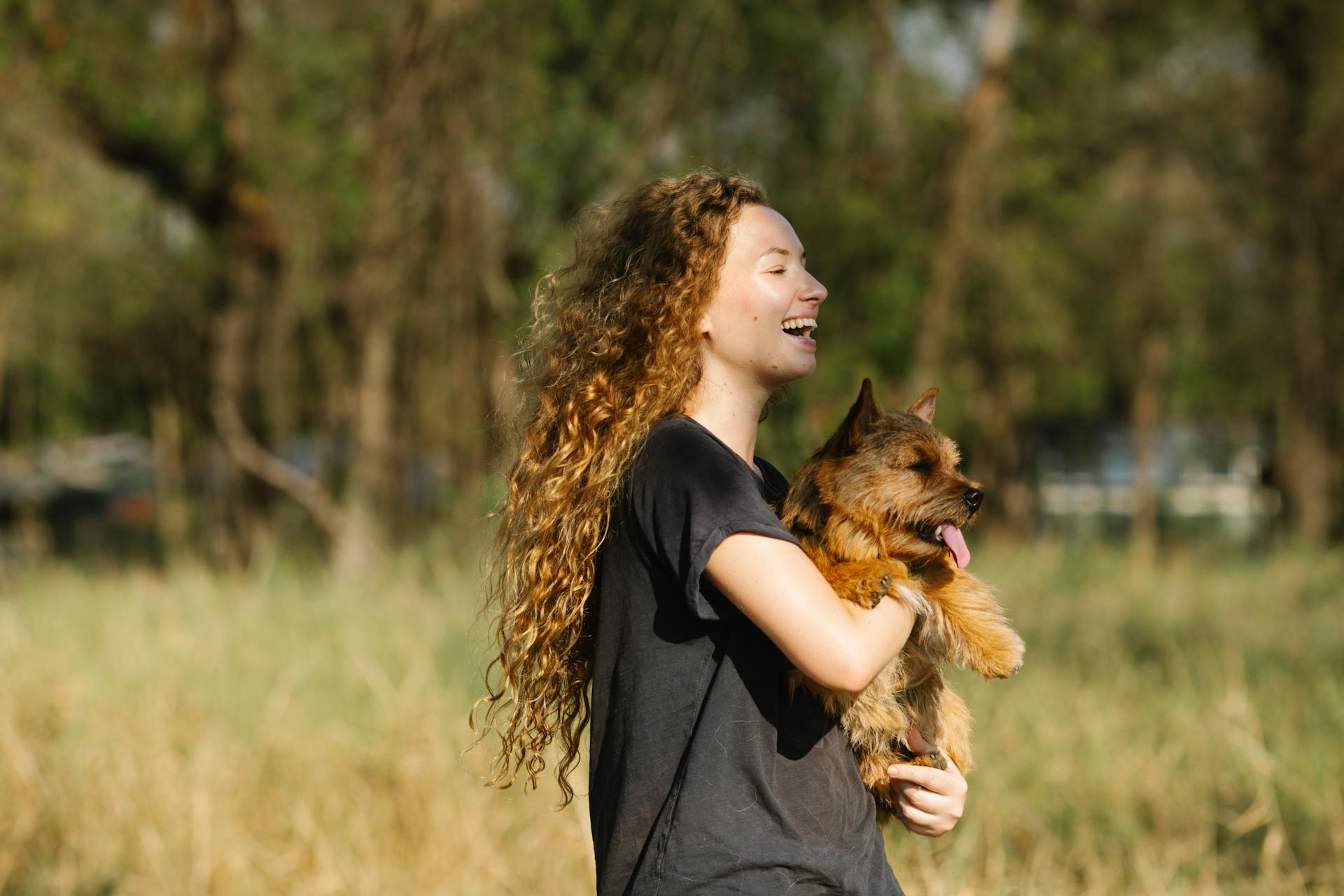
Pembroke Welsh Corgis are a popular breed for a reason - they're intelligent, loyal, and loving companions.
On average, a Pembroke Welsh Corgi adult will weigh between 25-38 pounds and stand between 10-12 inches tall at the shoulder.
To ensure your Corgi stays healthy, it's essential to keep them active, with at least 30 minutes of exercise per day.
Pembroke Welsh Corgis are prone to obesity, so be mindful of their food intake and avoid overfeeding.
Health and Care
Pembroke Welsh Corgis are generally healthy dogs with an average life expectancy of 12-13 years.
They are prone to certain health issues, including elbow and hip dysplasia, which can cause pain, lameness, and arthritis.
Degenerative myelopathy, a chronic and progressive disease of the spinal cord, is also a concern for this breed.
Regular veterinary visits and examinations are crucial to address any health issues as soon as possible.
To ensure your Pembroke lives a long and happy life, be aware of the following potential health problems:
- Elbow and hip dysplasia
- Cataracts
- Patent Ductus Arteriosus (PDA)
- Degenerative myelopathy
- Von Willebrand’s Disease
Pet Care
Pembroke Welsh Corgis are prone to several health issues, so it's essential to be aware of them and take preventive measures.
Routine veterinarian visits and examinations are crucial to address any health issues as soon as possible.
Pembroke Welsh Corgis have an average life expectancy of 12-13 years, but they can be susceptible to degenerative myelopathy, a chronic and often fatal disease of the spinal cord.
Degenerative myelopathy affects the white matter of the spinal cord and can cause symptoms like wobbling, inability to walk, and swaying while standing.
Elbow and hip dysplasia are common health issues in Pembroke Welsh Corgis, causing pain, lameness, and eventually arthritis.
Elbow and hip dysplasia can be diagnosed by an x-ray and treated with anti-inflammatory medication, joint protectant supplements, and surgery.
Pembroke Welsh Corgis are also prone to eye issues like cataracts, glaucoma, retinal dysplasia, and progressive retinal atrophy, which can impact vision.
To prevent tear-staining, it's a good practice to clean the eyes and surrounding areas daily, especially for Pembrokes with white or light-colored fur around the eyes.
Additional reading: Hip Dysplasia Bernese Mountain Dog
Pembroke Welsh Corgis require regular nail trims every 2 weeks or so and minimal maintenance grooming, but they do shed a lot.
To keep your Pembroke Welsh Corgi lean and in proper body condition, feed them dog food twice daily and avoid giving too many treats or human/table food.
Here's a list of common health issues in Pembroke Welsh Corgis:
- Elbow and hip dysplasia
- Cataracts
- Glaucoma
- Retinal dysplasia
- Progressive retinal atrophy
- Degenerative myelopathy
- Patent ductus arteriosus
- Von Willebrand disease
Size
When you're thinking about the health and care of your Pembroke Welsh Corgi, their size is a key factor to consider.
Pembroke Welsh Corgis are between 10 and 12 inches tall at the shoulders. This compact size means they're well-suited to apartment living and don't require a large yard.
Their weight is also important to keep an eye on, as they shouldn't weigh more than 30 pounds. This will help prevent obesity and related health issues.
Grooming and Maintenance
As you know, Pembroke Welsh Corgis have a beautiful thick double coat that requires regular grooming. Daily brushing with a comb and slicker brush is the best way to keep their hair off the floor and furniture.
You'll want to brush your Corgi's coat daily, especially during shedding seasons, which can be in the late spring or early summer. This will loosen the dead hair and make it easier to comb out.
Their nails grow at a different rate, but a general rule is to trim them every two to four weeks or before you hear them clicking on the floor.
Regular ear cleaning is also essential, checking their ears weekly for dirt or signs of infection, like redness or swelling. If you notice anything, speak to your vet.
Dental care is also crucial, brushing your dog's teeth daily to reduce plaque and tartar, and getting an annual professional dental cleaning by a veterinarian.
Here are some specific grooming tips to keep in mind:
- Brush their coat daily, especially during shedding seasons.
- Trim their nails every two to four weeks or before they start clicking on the floor.
- Check their ears weekly for dirt or signs of infection.
- Brush their teeth daily to reduce plaque and tartar.
Diet and Nutrition
Pembroke Welsh Corgis are prone to being overweight, so it's essential to monitor their food intake and weight.
Feed your adult Pembroke Welsh Corgi twice a day, with the recommended daily amount ranging from 3/4 to 1.5 cups of high-quality dry food, divided into two meals.
If this caught your attention, see: Best Food for Border Collies
You should be able to see a waist when looking down at your Pembroke, and you should be able to feel but not see their ribs without having to press hard.
Pembroke Welsh Corgis under one year of age need a diet formulated especially for puppies, while adult dogs can be switched to food labeled for adult dogs after one year of age.
To determine how much to feed your Corgi, consult with your veterinarian, follow the package instructions, or contact the dog food manufacturer.
Here's a quick guide to help you feed your Pembroke Welsh Corgi:
Remember to choose a high-quality, AAFCO-approved dog food and consult with your veterinarian for specific recommendations on feeding your Pembroke Welsh Corgi.
Training and Behavior
Pembroke Welsh Corgis are intelligent dogs that thrive on mental stimulation and training. They require significant training to keep their brains busy and occupied, especially since they were bred to herd.
Early socialization is crucial, especially between 7 weeks and 4 months, to help your Corgi grow up to be a confident, well-adjusted adult dog. This involves taking your pup on walks to meet new people and dogs, and enrolling them in puppy school.
Pembroke Welsh Corgis are naturally reserved around strangers, but proper training and socialization can help them become great watchdogs. They may nip at ankles, which can be a challenge, especially around young children.
These dogs crave activities and challenges, making training an absolute must. They'll explore things using their mouth by biting and/or chewing, which can be painful and destructive.
With consistent training that focuses on positive reinforcement and rewards, Pembrokes can master basic commands and learn new tasks. They're sensitive dogs, so harsh training methods should be avoided.
Overall, Pembroke Welsh Corgis are intelligent, energetic, and loving companions that require regular exercise, mental stimulation, and proper training to thrive.
Characteristics of the
The Pembroke Welsh Corgi is an intelligent breed that thrives on mental and physical stimulation. They have a high energy level and require regular exercise to stay happy and healthy.
Pembroke Welsh Corgis are naturally loyal and loving dogs, but they can be territorial around other dogs and cats. This is a result of their breeding history as herding dogs, designed to protect their flocks from strangers.
Their short legs allow them to sploot, a cute move where they lie on their stomach with their back legs extended out. This is a fun trait to observe and play with.
Here's a breakdown of some key characteristics of the Pembroke Welsh Corgi:
Pembroke Welsh Corgis have a medium-length topcoat with a short undercoat, which requires regular grooming. They come in a variety of colors, including fawn, red, sable, and black and tan.
Training
Training is a must for Pembroke Welsh Corgis, as they are intelligent and love to learn. They require significant training to keep their brains busy and occupied.
Pembroke Welsh Corgis are naturally reserved around strangers, so early socialization is key to helping them grow up to be confident, well-adjusted adult dogs. They need to be exposed to many different people, sights, sounds, and experiences when they're young.
Positive, reward-based training is the way to go with Pembrokes, as they are highly sensitive and respond well to treats, praise, and play breaks. Consistent training that focuses on positive reinforcement and rewards will help them master basic commands and learn new tasks.
Pembroke Welsh Corgis have a tendency to herd by nipping at the ankles, which can be a problem, especially with young children or other pets. Proper training and socialization can help curb this behavior.
To keep your Pembroke Welsh Corgi happy and healthy, provide them with regular exercise, such as daily walks, and engage them in activities that challenge their minds, like Treibball or agility training.
Here are some essential commands to teach your Pembroke Welsh Corgi:
- Sit
- Stay
- Come
- Leave it
- Drop it
These commands will help you manage your Pembroke's herding tendencies and ensure they learn when it's okay to bark and herd.
Exercise
Pembroke Welsh Corgis are built for physical activity, needing at least one hour of exercise every day to stay happy and healthy.
As puppies, they have boundless energy, but as adults, they tend to chill out a bit, so a daily long walk or slow jog is perfect. They love water and are great swimmers, making them a great choice for active families.
Corgis are working dogs, bred to herd cattle, so they love physical activity and having a task to complete. This means they excel in dog sports like agility, herding, and tracking.
Their thick double coat makes them well-suited for cold weather, but they get hot easily, so be sure to keep outside activities to the cooler parts of the day in the summer months.
If you're looking for a pet that will keep up with your active lifestyle, a Pembroke Welsh Corgi may be a great choice. They love people and assume everyone is there to pet and play with them, so be prepared for lots of interaction.
Here are some fun activities to consider:
- Obedience training
- Agility training
- Treibball
- Rallying
- Tracking
- Herding
- Mental stimulation (such as puzzle toys)
- Hide and seek
- Indoor fetch
- Frisbee
Remember, Corgis are smart and need to keep their minds occupied, too, so be sure to provide plenty of mental stimulation and exercise to keep them happy and out of trouble.
Ownership and Adoption
If you're considering bringing a Pembroke Welsh Corgi adult into your home, it's essential to understand the responsibilities involved in their care.
Pembroke Welsh Corgis can be strong-willed and independent, so it's crucial to have experience with patiently handling them.
Before making a decision, take the time to research and understand the needs of this breed.
To adopt a Pembroke Welsh Corgi, you can start by searching for local breeders or rescue groups in your area. Some examples of reputable rescue groups include Lakeshore Pembroke Welsh Corgi Rescue.
Here's a list of resources to help you get started:
- The Pembroke Welsh Corgi Club of America is a great resource for finding local breeders and rescue groups.
- Rescue groups can be found in many states, and some regional organizations cover large areas.
Pembroke Welsh Corgis can be expensive to purchase from a reputable breeder, with prices ranging from $1,000 to $2,000 or more.
Prospective Owners
Choosing the right breed for you and your family is crucial. Consider factors like your lifestyle, living situation, and the amount of time you have to devote to your dog.
If you're thinking of getting a dog, you might wonder why you should bother. The answer is simple: dogs bring joy, companionship, and a sense of purpose to our lives.
Finding a responsible breeder is essential to ensure you're getting a healthy puppy. Look for breeders who are transparent about their breeding process, health clearances, and temperament testing.
Getting started in dog sports can be a fun and rewarding experience for you and your dog. Many breeds excel in activities like agility, obedience, and herding.
Puppies are a bundle of energy and require a lot of attention and care. Make sure you're prepared to provide a stable and loving environment for your new furry friend.
Here are some key things to consider when choosing a breed:
- Energy level: Some breeds need a lot of exercise, while others are content with short walks.
- Grooming: Some breeds require regular grooming, while others are low-maintenance.
- Size: Consider the space you have available for a large breed or a small one.
- Temperament: Some breeds are great with children, while others are better suited for older adults.
Adopt/Buy
If your first impulse is to Google 'Corgi Puppies for sale near me,' you may want to begin your search with 'Corgi rescues near me,' as there are many Pembrokes in need of adoption and/or fostering.
Pembroke Welsh Corgis can be expensive, with a purebred from a reputable breeder costing anywhere from $1,000 to $2,000 or more.
Before bringing a Pembroke Welsh Corgi into your home, it helps to have experience with how to patiently handle a strong-willed and independent pup.
You can find Pembroke Welsh Corgi breeders located around the country, or contact a national organization that may be able to locate a rescue.
The Pembroke Welsh Corgi Club of America is a terrific resource, with branches of regional clubs, rescue and adoption information, and breeder contacts.
To find a local rescue group, you can also contact a local breed club, which can point you toward a Pembroke rescue.
Here are some resources to get you started:
- Lakeshore Pembroke Welsh Corgi Rescue
- The Pembroke Welsh Corgi Club of America
General Information
Pembroke Welsh Corgis are known for being very friendly and playful dogs. They love to be around people and other animals, and they make great companions for families.
They are intelligent dogs and are relatively easy to train. Corgis can learn a variety of commands, and they are often used as therapy dogs.
Their short legs give them a distinctive look, and they're also known for their ability to "sploot", which is when they lie down with their legs splayed out behind them.
Corgis are loyal dogs that form strong bonds with their owners and families, and they're always happy to see them.
History
The Pembroke Welsh Corgi has a rich history that spans over 1,000 years, dating back to around 1107 A.D.
The breed's origins are shrouded in mystery, with theories suggesting they may have descended from Swedish Vallhunds or brought to Wales by Flemish weavers.
They were developed in Wales as herding, companion, and/or guard dogs, and were often crossed with other breeds, including the Cardigan Welsh Corgi.
In 1934, the Pembroke Welsh Corgi was officially recognized as a separate breed by the English Kennel Club and the American Kennel Club (AKC).
Queen Elizabeth II has been a long-time fan of the breed, receiving her first Pembroke Welsh Corgi from her father in 1933.
Some Pembrokes are born with only a stub of a tail, while others have had their tails docked to meet breed standards.
If this caught your attention, see: American Kennel Club Lancashire Heeler
Highlights

Corgis are known for their friendly and playful personality, making them great companions for families.
They are also intelligent dogs, which means they're relatively easy to train and can learn a variety of commands.
One of their unique characteristics is their herding instincts, which can sometimes lead them to try and herd people or other animals.
Corgis have short legs, giving them a distinctive look, and they're also famous for their ability to "sploot", which is when they lie down with their legs splayed out behind them.
Their loyalty is truly one of their best qualities, as they form strong bonds with their owners and families, and are always happy to see them.
Tips and Considerations
Pembroke Welsh Corgis can be prone to joint issues, so it's a good idea to consider adding joint supplements to their diet, such as glucosamine, chondroitin, and MSM.
These supplements have anti-inflammatory properties, which can help control pain associated with osteoarthritis.
Feeding your Pembroke a well-balanced, AAFCO-approved diet is essential, but you may also want to consider adding essential fatty acids, like omega-3 fatty acids from high-quality fish oil, to help support eye and heart conditions.
Research shows that reducing inflammation can also help control pain, so it's worth exploring these options with your veterinarian.
Pembrokes require regular grooming, including routine brushing, as they shed a lot.
Frequently Asked Questions
How big will a Pembroke Welsh Corgi get?
A Pembroke Welsh Corgi typically grows to 10-12 inches at the shoulder and weighs 27-30 pounds. This compact size makes them a big dog in a small package.
Can Corgis live to 20?
Yes, Corgis can live up to 20 years, but their average lifespan is typically between 12-15 years.
What are the pros and cons of a corgi?
Corgis are intelligent, easy to train, and quick learners, making them a great choice for owners who enjoy teaching new tricks. However, their intelligence can also make them stubborn at times, requiring patient and consistent training.
Are Welsh corgis cuddly?
Welsh corgis are known to be affectionate and often enjoy physical affection, but some may show love in other ways. They can make great cuddle companions for those who appreciate their unique personalities.
Do corgis bark a lot?
Yes, Corgis are known to bark frequently due to their herding instincts, which originally helped them alert shepherds to potential dangers. While they may bark more than average, it's a natural behavior for this breed.
Featured Images: pexels.com


